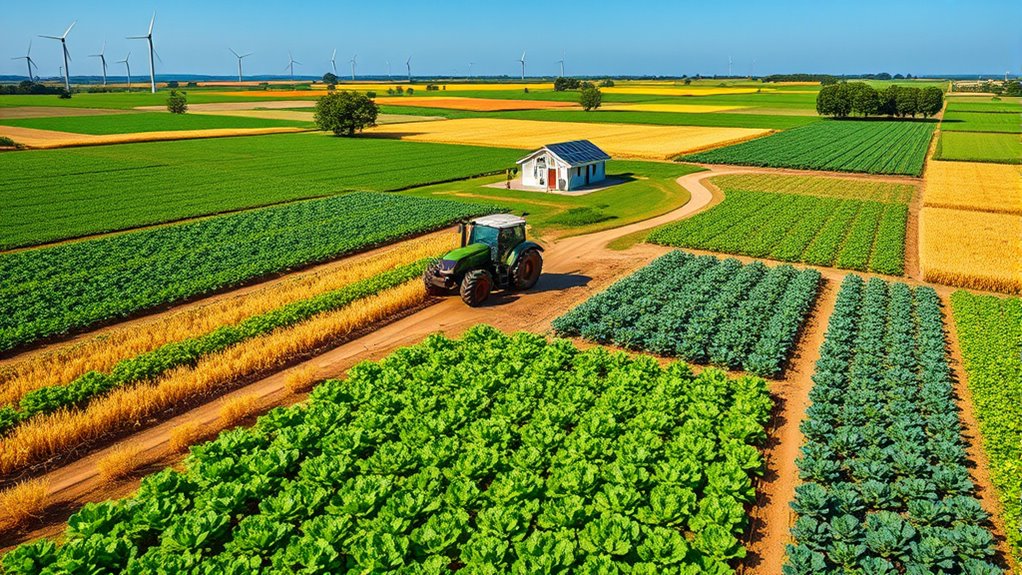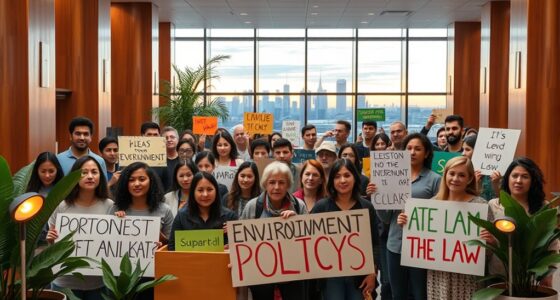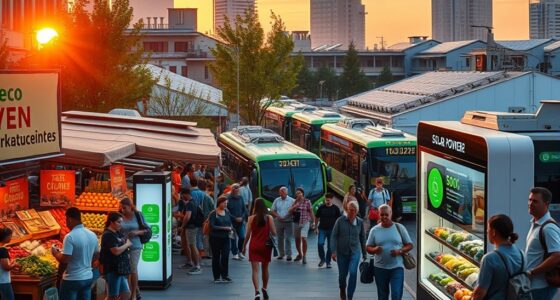Sustainable farming and food policies, such as farm bills and organic standards, aim to create resilient, environmentally friendly food systems you can trust. By supporting local food initiatives, urban agriculture, and organic practices, these policies help reduce emissions, conserve resources, and promote food sovereignty. They empower communities to take control of their food sources while protecting soil health and biodiversity. Exploring these policies further can reveal how they shape a healthier, more equitable future for everyone.
Key Takeaways
- Farm bills shape sustainable agriculture policies by supporting organic standards, conservation programs, and local food systems.
- Organic standards ensure environmentally safe farming practices that conserve soil health, biodiversity, and reduce chemical use.
- Policies promote urban agriculture and community-led initiatives, enhancing local food access and resilience.
- Food sovereignty emphasizes community control over production, fostering independence and social equity in food systems.
- Sustainable policies incentivize resource conservation, climate resilience, and environmentally friendly farming methods.

Sustainable farming and food policies are vital for ensuring a healthy planet and secure food supply for future generations. When you think about building resilient food systems, urban agriculture plays a pivotal role. It allows you to grow fresh produce directly within city environments, reducing the reliance on long-distance transportation and lowering carbon emissions. By encouraging urban farming initiatives, policymakers can empower communities to take control of their food sources, fostering food sovereignty. This means that you, as an individual or community, can have a say in what you eat and how it’s produced, rather than depending solely on large industrial farms or distant supply chains.
Implementing policies that support urban agriculture isn’t just about planting crops in vacant lots or rooftops; it’s about creating an extensive framework that promotes local food production, equitable access, and environmentally friendly practices. When you’re involved in local food systems, you’re more likely to support sustainable methods like organic farming, which reduces chemical use, conserves soil health, and promotes biodiversity. Organic standards ensure that food grown within urban settings maintains high quality and minimizes harm to the environment, aligning with broader sustainability goals. Additionally, incorporating organic standards into policy frameworks helps to maintain consumer trust and promotes transparency in food production.
Food sovereignty also benefits from these policies because they prioritize community-led initiatives over corporate-controlled food systems. When you advocate for policies that bolster urban agriculture, you’re helping to decentralize food production, making it more accessible and resilient to disruptions like climate change or economic downturns. This approach fosters a sense of independence and self-reliance, allowing communities to better withstand external shocks. It also ensures that marginalized groups have a voice in the decision-making process, promoting social equity alongside environmental sustainability. Furthermore, local food systems can be strengthened through educational programs and community engagement efforts, which are vital for long-term resilience.
Furthermore, supporting urban agriculture through sensible farm bills and food policies encourages innovation in sustainable practices. You’ll see more incentives for organic farming, community gardens, and local food cooperatives. These initiatives not only improve access to healthy, fresh food but also help reduce waste and energy consumption. When policies prioritize these practices, they set a standard that aligns with global efforts to combat climate change and protect natural resources.
In essence, your involvement in shaping or supporting policies that promote urban agriculture and food sovereignty can make a significant difference. It’s about creating a food system that’s fair, resilient, and environmentally sustainable—one that meets the needs of today while safeguarding the future. By championing these ideas, you contribute to building a healthier planet where everyone has the right to nutritious, locally produced food.
Frequently Asked Questions
How Do Organic Standards Impact Crop Yields Long-Term?
You might wonder how organic standards affect long-term crop yields. By focusing on soil health, organic practices improve soil fertility and structure over time, leading to resilient crops. Pest management shifts toward natural methods, reducing chemical reliance and promoting biodiversity. Although yields can fluctuate initially, maintaining healthy soil and eco-friendly pest control often results in stable or improved yields in the long run, supporting sustainable farming practices.
What Funding Options Support Small Sustainable Farms?
You can access various funding options that support small sustainable farms through financial incentives like grants and low-interest loans. Community grants are also a great way to get local support for sustainable projects. These options help cover costs for eco-friendly equipment, organic certification, and conservation efforts. By exploring these resources, you make it easier to implement sustainable practices and grow your farm responsibly.
How Do Food Policies Address Climate Change Mitigation?
You see that food policies aim to combat climate change by promoting practices that reduce greenhouse gas emissions. They incorporate carbon pricing to incentivize farmers to lower their carbon footprint and support renewable incentives that encourage adoption of clean energy sources. These policies motivate you to adopt sustainable methods, helping mitigate climate change effects while ensuring food security. By aligning agricultural practices with climate goals, food policies play a crucial role in creating a greener future.
Are There International Differences in Sustainable Farming Regulations?
Ever wondered if countries follow the same rules for sustainable farming? International compliance varies greatly, with some nations adopting strict regulations and others less so. Regulatory harmonization is limited, creating differences that can complicate global efforts. These disparities affect how food policies support sustainability and climate goals. You must consider these international differences when working toward unified standards, making it clear that sustainable farming regulations aren’t yet universally aligned.
How Can Consumers Influence Sustainable Food Policy Development?
You can influence sustainable food policy development through consumer activism and policy advocacy. By supporting organizations that promote sustainable practices, signing petitions, and participating in campaigns, you send a strong message to policymakers. Your choices as a consumer, like buying organic or locally-sourced foods, also put pressure on the industry. Together, these actions help shape policies that prioritize sustainability and fair farming standards.
Conclusion
By embracing sustainable farming and food policies, you’re planting seeds for a healthier planet and future generations. These policies are the roots that support organic standards and farm bills, creating a resilient, thriving food system. Think of them as a compass guiding us through the complex landscape of agriculture. When you support these initiatives, you’re not just making a choice—you’re steering the ship toward sustainability, ensuring the harvest of hope for all to come.









